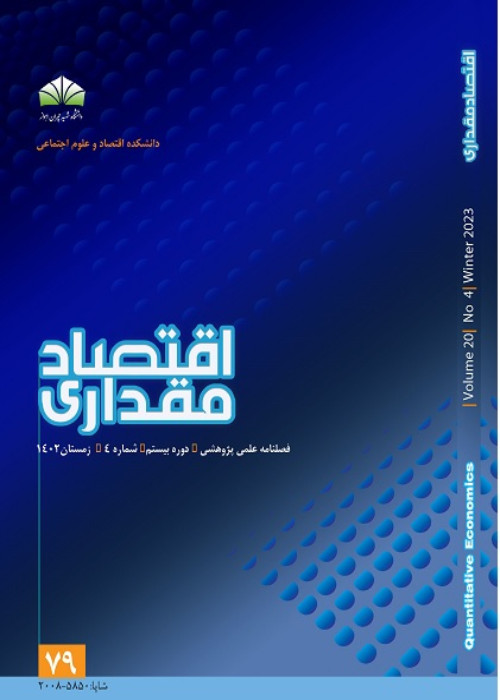The effect of terrorism on economic growth in selected countries of the Middle East: a panel spatial econometric approach
In developing countries, economic growth is the main concern of policy makers and economic thinkers. Knowing the tools and factors affecting economic growth is essential and requires deeper investigations. The importance of knowing the effective factors in the growth and development of countries in today's growing world is undeniable. The degree of effectiveness and recognition of these factors can be an important step towards accelerating growth and development. Accelerating economic growth is a tendency in developing countries. Economists are looking for an answer to the main question, what are the reasons for the difference in the economic growth of the countries of the world? In examining the factors affecting economic growth, two groups of causes can be mentioned. The first group is related to direct factors such as the accumulation of human and physical capital, and the second group includes final factors such as institutions, social capital, etc. In relation to political factors, the situation of developing countries is slightly different from their situation and performance regarding economic factors, especially, the internal economic structure of countries is very vulnerable to adverse factors. Political instability, as the most important internal factor, has the closest interaction with the concept of economic security in influencing the performance of macroeconomic variables, including production. The insecurities that arise in the atmosphere of political instability and violent behavior (such as terrorist activities) in developing countries cause the country's inability to successfully attract foreign capital, capital flight and reduction of capital. Investments are made. Among the indicators of political instability, which has been raised as one of the sensitive issues of the international community, especially developing countries, and its effects on the developments of international economic and political relations, is the phenomenon of terrorism. In this context, Asimoglu (2001), believes that with more efficient and better institutions, more investment will be made in the field of physical and human capital, security, improvement in property rights and less deviations in policies. Among the variables affecting growth and investment, security is a key category. Security is a complex concept and due to the existence of constituent quality indicators and its complexity, both theoretically and empirically, it is a source of controversy. Terrorism is a fundamental factor disrupting economic and social security.
The purpose of this research is to investigate the relationship between terrorism and economic growth in selected countries of the Middle East using the panel spatial econometric method during the period of 1980-2019 using the spatial Durbin model (SDM). Statistics and information required for variables of GDP per capita, foreign trade as a percentage of GDP, bank credits granted to the private sector, foreign direct investment as a percentage of GDP and inflation rate from the World Bank website and For the terrorism variable, it has been extracted from the global database of terrorism, separately for 9 selected countries in the Middle East region.
First, in order to check the spatial dependence of the Moran and Jerry C test, the spatial dependence of the countries was confirmed and based on the significance of the Moran test, the research model was estimated in the spatial panel framework. According to the results of the research, terrorist activities show negative and destructive effects on the economic growth of these countries, and this result is consistent with the results of other studies such as Hamida (2018) and Sanafdiari (2017). According to the results of the research, the variables of foreign direct investment, foreign trade, and bank credits have a significant and positive effect on the economic development of the studied countries, of which foreign investment and foreign trade have the greatest impact on economic growth. Also, the inflation rate has a negative and significant effect on the economic growth of the above countries, and these results are consistent with the results of other studies such as Kavah (2007), Khan (2019), Haider et al. (2015) and Sana and Shafi (2018). Be
Terrorism and the increase in casualties caused by accidents have had a negative effect on economic growth. Terrorism affects economic growth through different channels. The increase in threats and terrorist incidents leads to insecurity in the country of origin and negatively affects the arrival of tourists. Terrorism also negatively affects investment in tourism-related fields by reducing the sense of security and prevents the strengthening of this sector. The direct effect of these terrorist incidents is to create an atmosphere of insecurity on the economy; Because it destroys and diverts productive economic resources. Scarce productive resources that could have been used to produce goods and services in society are now gone. Also, the resources and budgets allocated for other useful sectors of the economy, as a result of terrorist incidents, should now be used to strengthen the country's security. None of these changes, which are necessary to create security, will not create additional wealth for the society and will not raise the level of well-being, and will also negatively affect economic growth. On the other hand, foreign direct investment is one of the main drivers of economic development and its flow has strong effects on the country's economy. Terrorist activities reduce security and reduce investors' trust in countries exposed to terrorist activities, which leads to a decrease in the flow of foreign direct investment.
- حق عضویت دریافتی صرف حمایت از نشریات عضو و نگهداری، تکمیل و توسعه مگیران میشود.
- پرداخت حق اشتراک و دانلود مقالات اجازه بازنشر آن در سایر رسانههای چاپی و دیجیتال را به کاربر نمیدهد.


